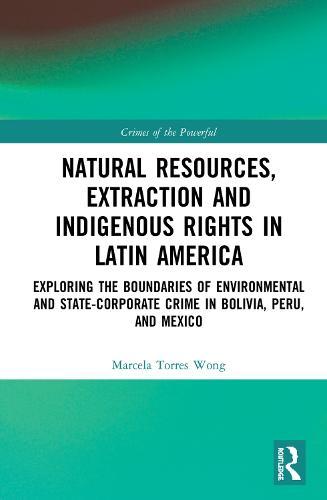Full Product Details
Author: Marcela Torres Wong
Publisher: Taylor & Francis Inc
Imprint: Routledge
Weight: 0.498kg
ISBN: 9780815381525
ISBN 10: 0815381522
Pages: 164
Publication Date: 31 August 2018
Audience:
College/higher education
,
Tertiary & Higher Education
,
Undergraduate
Format: Hardback
Publisher's Status: Active
Availability: In Print

This item will be ordered in for you from one of our suppliers. Upon receipt, we will promptly dispatch it out to you. For in store availability, please contact us.
Reviews
Marcela Torres Wong has written a tour de force on the extractive conflicts in Latin America and the rights of indigenous peoples, specifically in the countries of Mexico, Peru, and Bolivia. Her methodological diversity and her on the ground filed techniques serve not only to demystify our previous understandings of indigenous peoples rights and their struggles to survive in a global political economy, but she also shines light on and captures the geo-political realities of Green Criminology and sustainability in the 21st century. - Gregg Barak, Professor of Criminology and Criminal Justice at Eastern Michigan University, USA Does the implementation of the right to prior consultation granted by ILO Convention 169 protect indigenous territories from ecologically controversial extractive industries? This is the leading question put by Marcela Torres Wong in this disruptive book that demystifies and shed new light on the issue. Using case studies she empirically demonstrates that the legalization of prior consultation has not been the most adequate way to achieve the safeguard of indigenous peoples and that this legal mechanism even enables the state to further extractive projects. In light of green criminology studies Torres Wong explains the tension between pro-extractivist and anti-extractivist indigenous movements as a consequence of the industrialized exploitation of natural resources. This is a must read for scholars, politicians and civil society interested in a fair relationship between global economic interests, natural resources and human rights of indigenous people. - Maria Laura Boehm, DAAD Long Term Guest Professor, Department of Criminal Law and Criminology, and Department of Social Sciences, University of Buenos Aires, Argentina
Marcela Torres Wong has written a tour de force on the extractive conflicts in Latin America and the rights of indigenous peoples, specifically in the countries of Mexico, Peru, and Bolivia. Her methodological diversity and her on the ground filed techniques serve not only to demystify our previous understandings of indigenous peoples rights and their struggles to survive in a global political economy, but she also shines light on and captures the geo-political realities of Green Criminology and sustainability in the 21st century. - Gregg Barak, Professor of Criminology and Criminal Justice at Eastern Michigan University, USA
Author Information
Marcela Torres Wong is a Peruvian lawyer and anthropologist at the Pontificia Universidad Catolica del Peru. She has a PhD in Political Science from The American University in Washington, DC. Since 2017, she has worked as a full-time professor and researcher in the Latin American Faculty of Social Science (FLACSO) in Mexico City. Her research interests include indigenous movements, extractive industries and socio-environmental conflicts in Latin America. She has received grants from the Inter-American Foundation (IAF), the Tinker Foundation, and the Centre National de la Recherche Scientifique (CNRS).




